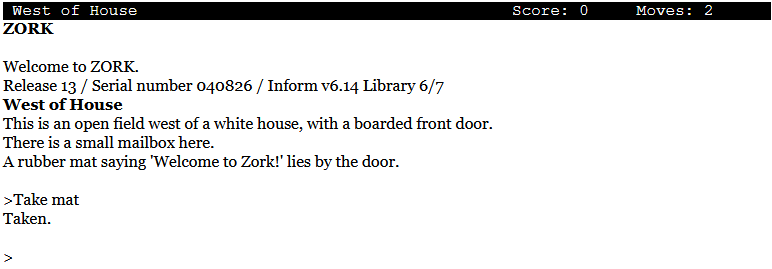Hey @Looten, once upon a time, before the internet had pages or pictures, it was all text-based. Some crafty gamers (who also happened to be computer science majors) put together the first code of what was, at the time, one of the first kinds of online multi-player role-playing games, known as MUDs, and they were completely text-based. I’m thinking DikuMUD, one of the first, came out in 1991 or so.
A user used his or her computer Telnet feature to reach out to a server address and then connect the player to the game. At login, new players were greeted with a create character prompt, followed by stat generation, a choice of class and sometimes race, which was very much like traditional RPG character generation. From there, the newly minted player was deposited into a “room” with newbie gear, usually a wooden sword and newbie armor. A room had a text-based description like, “You are standing on a lush green hill. To your north, roughly hewn stones form the basis of a strong castle wall. A sign has been affixed to it. A well-traveled road runs to the east and west. To the south, you can hear the babbling of a small stream.
A town guard is here.”
From there, the game was controlled by various commands. Typing “East” made the player walk East, and his or her screen would update with a new room. Typing a verb command with an object might give additional information like, “look sign,” and then you’d get the update on your screen. The text constantly flowed upward from the bottom. You could “look south” and get more detail about the stream. There were also social commands of another player arrived in your room, “Alex has arrived.” You could also say, tell, group-speak, or engage in a million emotes. Alex Smirks
And then of course, there were fighting commands. “Attack Guard.” Typing this last part would cause combat to commence, which involved a large immediate influx of scrolling from the bottom:
Alex EVICERATES the town guard with his devastating slash!
The town guard hits Alex with a broad sword!
Alex DESTROYS the town guard with his devastating slash!
And so on. Meanwhile, you’d watch your hit points tick down. You could also cast spells on your self or others: “cast heal Alex” and then watch your mana go down.
The game operated on an internal clock known as ticks, which ultimately brought some health and mana regen naturally, though loot and spells could alter those rates. Resting and catching the tick before a major fight was a big deal.
And then there was loot and running around the zones for loot. As monsters (mobiles or mobs) loaded in, they also had random loading rates for gear. Some mobs could be farmed. Others only loaded choice gear randomly, and still others only loaded when the game was rebooted or reset, maybe because it crashed or came back up. In those instances, when people rejoined, they raced to choice spots to farm rare gear. You could also join up with players, forming a group: “follow Looten.” In that regard, every room I entered, you followed with me. Our group would have our own internal group speak, and we could monitor each other’s health and heal one another, with one player tanking the fight and the others joining in and providing support. In this manner, players formed natural specialized roles of tanking, healing, backstabbing, or casting offensive magic. In truth, the influence on modern day MMORPGs is undeniable.
But the one advantage of a purely text-based game is that The Pit Fiend, or Siawyn, The Champion of Rhyoden, will always be far more scary in my head then they ever would be in a video game with graphics.
I could go on and on about how cool these games were, with my buddies and me taking over a university computer lab to mud together all weekend, but the above should give you a decent sense of the game. There are a few good articles out there about them. I was privileged to play some of the early ones and meet some influential folks behind them back then.



